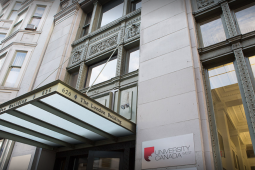Academic excellence, affordable education options and adventure: Canada is one of the ideal destinations to study. Canada is home to more than 250,000 international students and has been receiving requests from an increasing number of students from overseas in recent years.
Canadian University Education System and Duration
Canada offers a diverse and high-quality higher education system, including universities, colleges, and vocational institutions. Most undergraduate programs last between three to four years, depending on the field of study and institution. Graduate programs, including master's and doctoral degrees, generally take one to two years and three to five years, respectively.
Canadian universities emphasize both theoretical knowledge and practical experience, with co-op programs, internships, and research opportunities embedded into many programs. This structure ensures that students not only gain academic knowledge but also develop professional skills relevant to their chosen careers.
Top University Rankings in Canada
Canada is home to some of the world’s leading universities, recognized for academic excellence, research contributions, and global employability. Top-ranked institutions include:
-
University of Toronto – consistently ranked among the top 20 globally.
-
McGill University – renowned for research and medicine.
-
University of British Columbia (UBC) – strong in environmental sciences and engineering.
-
University of Alberta – known for innovation in energy and natural sciences.
-
McMaster University – globally recognized for health sciences and engineering.
These institutions attract students from all over the world, offering programs in English and French, and providing opportunities for international networking and cultural exchange.
Featured Faculties and Departments in Canada
Canadian universities provide a wide range of faculties and departments catering to diverse academic interests. Popular areas of study for international students include:
-
Engineering and Technology – computer science, civil, mechanical, and software engineering.
-
Health and Life Sciences – medicine, nursing, pharmacy, and biotechnology.
-
Business and Economics – finance, marketing, international business, and management.
-
Arts, Humanities, and Social Sciences – psychology, sociology, literature, and political science.
-
Environmental and Natural Sciences – biology, chemistry, environmental studies, and sustainable development.
Many institutions also offer specialized interdisciplinary programs, allowing students to combine multiple fields of interest and prepare for emerging industries.
Canadian University Admission and Application Requirements
Admission requirements in Canada vary by institution and program but generally include the following:
-
Completion of a recognized secondary school or undergraduate program, depending on the level of study.
-
Submission of academic transcripts and diplomas.
-
Proof of English or French language proficiency, typically through tests such as IELTS, TOEFL, or TEF.
-
Letters of recommendation and a personal statement, depending on the program.
-
Some programs may require additional assessments, such as interviews, portfolios, or standardized test scores.
International students are encouraged to check the specific requirements of each institution and program well in advance of the application deadline to ensure compliance.
Canadian University Application Periods and Dates
Application timelines for Canadian universities vary depending on the institution and program. Generally, the academic year is divided into two main semesters:
-
Fall Intake (September–December) – Most programs begin in September, with application deadlines typically between December and March of the previous year.
-
Winter Intake (January–April) – Less common, with deadlines usually from August to October.
-
Summer Intake (May–August) – Available for selected programs, with deadlines around January–March.
It is important for international students to apply early, as some programs may have limited spots and additional requirements such as interviews or portfolio submissions. Early applications also allow sufficient time to obtain study permits and prepare for relocation.
Canadian Student Visa Requirements
To study in Canada, you will need a Canadian Study Permit and, depending on your home country, either an Electronic Travel Authorization (eTA) or a Temporary Residence Visa (TRV).
- Canadian Study Permit – this is not a visa, it is a permit that allows you to study in Canada. If you have a study permit, you must make reasonable and timely progress towards enrolling in a course and completing your courses.
- Electronic Travel Authorization (eTA) – This is an emerging visa exemption requirement for non-US foreign nationals. Your eTA is valid for 5 years or until your passport applies for an eTA extension, whichever comes first, and can be used for multiple trips to Canada.
- Temporary Residence Visa (TRV) – used for students who have been accepted by an approved educational institution and are unable to apply for the eTA.
To find out if you need an eTA or visitor visa and how to apply, you can visit the Government of Canada website.
Applying for a study permit
Requirements to apply for a study permit:
- An acceptance letter from your educational institution
- A valid passport or travel document
Also:
- Proof that you have the necessary funds for the following payments:
- Tuition fees
- Living expenses for yourself and any family members who will come to Canada with you, and
- Return transportation costs for yourself and, if applicable, any family members traveling to Canada with you
- Be a law-abiding citizen with no criminal record and pose no risk to Canadian security (you may be required to show proof of criminal record)
- You are in good health (you may need to go through a full health check)
- Convincing immigration officials that you will leave Canada when you finish your studies.
The following documents may be requested from you as proof that you can finance yourself and any accompanying family members:
- If money has been transferred to Canada, proof of account opened in your name with a Canadian bank
- Proof of obtaining a student/educational loan from a financial institution
- Summary showing bank account status
- Bank check on bondable money
- Proof of payment of tuition and accommodation fees
- Letter from the person or institution that covers your expenses
- Proof of payment from Canada if you have a scholarship or are enrolled in a Canadian-funded study program
Working Part-Time While Studying in Canada
Working part-time during your studies can be a great way to add to your living expenses in Canada. You can also gain work experience in your field.
You can work without a work permit while studying in Canada if you meet the following conditions.
- If you have a valid study permit
- If you are a full-time student
- If you are enrolled in an accredited post-secondary education institution or a high school-level vocational program in Quebec
- If you are studying at an academic, vocational or professional education institution that offers a degree, diploma or certificate for at least 6 months
If you meet these conditions:
- You may work up to 20 hours per week during regular academic terms, and
- You can work during planned holidays such as summer and winter holidays or spring break.
If you have a valid study permit or if you are a full-time student at one of the following institutions then you can work in on-campus jobs:
- A government-owned post-secondary educational institution, such as a college or university, or the collège d'enseignement général et professionnel (CEGEP) in Quebec
- Private post-secondary education institutions that are operated under the same rules and regulations as the public education institution and that meet at least 50 percent of the financing required for all their operations with government grants (currently only private college-level educational institutions in Quebec qualify)
- A Canadian private education institution authorized by the province to award degrees
Your social security number
You will need a Social Security Number (SIN) from Service Canada to receive discounts or service from government programs.
As a condition of your application to the SIN to work in an on-campus job, you must meet one of the following conditions, and your study permit must be stated on it:
- Can work in jobs on the campus of the institution where he/she is studying full-time
- May work on or off campus if you meet the eligibility criteria set out in R186(f), (v), or (w). If it no longer meets these criteria, it should stop working.
If your study permit does not meet any of these conditions or phrases, you will need to submit a free petition for a change in your study permit before applying for a SIN.
Work after graduation
If you want to stay in Canada after your studies, completing the Post-Graduation Work Permit Program (PWPP) will give you invaluable work experience. This program will also help you later if you consider applying for permanent residence in Canada.
PWPP work permits are valid for the duration of your initial training program (up to a maximum of 3 years) and give you the right to change jobs at any time, along with the right to work in the occupation of your choice.
To be eligible for the program, you must have graduated from a public or private institution with a degree recognized by the Canadian government or one of its provinces. You must apply to PWPP within 90 days of receiving written confirmation of the end of your academic program.
Living Costs in Canada for International Students
Tuition fees for international students in Canada vary by program and institution. On average, international undergraduate students pay approximately CAD 36,100 per year, while graduate students pay around CAD 21,100 per year . It's important to note that these figures are averages; actual tuition fees can differ based on the specific institution and program of study.
Living Expenses
The Government of Canada requires international students to demonstrate sufficient funds to cover living expenses. As of September 1, 2025, the minimum required amounts are:
-
Single student: CAD 22,895 per year
-
Two family members: CAD 28,502 per year
-
Three family members: CAD 35,040 per year
-
Each additional family member: CAD 6,170 per year .
These amounts are intended to ensure that students can support themselves without financial strain during their studies.
Monthly Living Costs
Monthly living expenses for international students in Canada typically range from CAD 1,200 to CAD 2,500, depending on the city and lifestyle . A breakdown of average monthly costs is as follows
-
Accommodation: CAD 700–1,500
-
Food and Groceries: CAD 250–600
-
Transportation: CAD 100–160
-
Health Insurance: CAD 75–120
-
Miscellaneous Expenses: CAD 100–200
It's important to note that living costs can vary significantly between cities. Major urban centers like Toronto and Vancouver tend to have higher living expenses, whereas cities like Winnipeg, Quebec City, and Halifax are more affordable options for students .
Accommodation in Canada
When it comes to finding a place to stay during your studies, you have three main options. Depending on your needs and budget, you can choose to rent an individual house/room, stay in a dormitory on or near campus, or live with a local family.
It may be much more convenient and practical for you to choose on-campus or near-campus accommodation options that your school, college or university has, so you do not have to commute to long distances. It's also a great way to make new friends.
Renting a house gives you privacy and freedom when you live alone and the opportunity to share accommodation costs when you live with friends. Homestay, on the other hand, offers you all the comforts of living with a local family, allowing you to both learn more about the local culture and improve your English by practicing outside of class.
Whichever option you choose, you need to keep in mind:
- How much do you intend to spend? Don't forget to add to this the extra costs, such as the deposit fee paid when renting the house, and the electricity, gas or water bill.
- How far do you want to be? Calculate how easy it would be to travel between home and campus.
- What do you want to be close to? Decide what other amenities you prefer to be near, such as shopping malls, restaurants or health services.
If you need help finding accommodation in Canada, contact your institution's housing office or student services.
Canadian Universities and Prices
Schools have annual scholarship opportunities and discounts. Please contact our consultants for current price information. Prices are average annual prices and vary according to the departments.
| University of Manitoba | 18,000 - 23,500 CAD |
| University Canada West | 18,000 - 25,000 CAD |
| Brock University | 27,900 - 30,700 CAD |
| Cape Breton University | 16,100 - 17,100 CAD |
| Lakehead University | 25,000 - 34,000 CAD |
| Mount Saint Vincent University | 15,900 - 20,500 CAD |
| University of Regina | 20,400 - 24,800 CAD |
| Wilfrid Laurier University | 27,900 - 32,000 CAD |
| University of Northern British Columbia | 20,000 - 25,000 CAD |
| University of Ottawa | 35,500 - 52,800 CAD |
| University of Saskatchewan | 20,200 - 27,400 CAD |
| Toronto Metropolitan University | 28,700 - 38,500 CAD |
| Carleton University | 28,200 - 39,800 CAD |
| University of Windsor | 29,400 - 36,800 CAD |
| Algoma University | 20,000 - 30,000 CAD |
| Capilano University | 18,300 - 29,500 CAD |
Health and Support Services in Canada
Moving to a new country is not an easy process. For this reason, most universities, colleges and educational institutions offer specialized support services to help international students adjust to life in Canada and make the most of study and vacation time.
The Canadian Federation of Students and the Canadian Alliance of Student Associations are also great resources. You can visit their website to learn more about how they are helping students and defending your rights to the government on your behalf.
Campus support services
It is dedicated to supporting international students through a variety of orientations and programs. These may include supportive and educational workshops, cultural celebrations and academic support. Sometimes, they also assist students with accommodation and employment/internship opportunities.
Student unions on campus
Most institutions have their own student associations that help international students manage their various activities together with academics. Some universities also have private international student associations to offer impartial support to students from another country. For example, the University of Calgary has a Newcomers & International Students' Committee that ensures that all intercultural students have a say in front of both the Graduate Students' Association and the university's administration.
Off-campus student unions
There are various student associations working for the welfare of national and international students outside the campus. For example, the Canadian Federation of Students and the Canadian Alliance of Student Associations are two great resources to reach out to if you need help.
Support for students with disabilities
Most universities and institutions offer specific support to international students with disabilities, but it's best to let them know at the time of application to find out if any special arrangements need to be made for you. If you're studying in Ontario, you can also take advantage of a statewide social networking community for secondary school students with disabilities.
Finding a local doctor
When you get sick, your local doctor will provide you with basic healthcare where your privacy rights are protected. It also helps prevent future health problems. If necessary, he can refer you to a specialist.
To find a local doctor, you can:
- Ask someone you know
- Contact immigration support services
- Contact a public health center in your area to find out who is eligible.
- Go to a clinic that does not require an appointment.
Go to the dentist
- The best way to find a dentist is usually to search online or ask someone you know. Please note that dental health services cannot be provided free of charge under state health insurance. Therefore, you may want to take out extra insurance to cover dental costs.
What to do in an emergency
If you need emergency medical help, you should go to the nearest hospital's emergency department or call 911. Calling 911 is free and all emergency medical services are provided free of charge in hospitals. Depending on where you live and your health condition, a fee may be charged for the ambulance service.
If you have a serious health problem such as diabetes, high blood pressure or a drug allergy, you may want to wear a medical necklace or bracelet with your medical information.









































 +1 416 639 01 06
+1 416 639 01 06